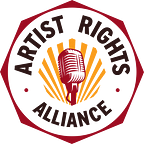Comments of the Artist Rights Alliance in Response to the Copyright Office Notice of Inquiry Regarding Technical Measures: Public Consultation
Delivered via regulations.gov
February 8, 2022
The Artist Rights Alliance (ARA) welcomes the opportunity to respond to the Copyright Office’s notice of inquiry regarding technical measures (“NOI”).
ARA is an artist-run, non-profit organization fighting for songwriters and musicians in the modern music economy. ARA works to ensure artists are at the table when decisions are made on policies that affect their lives and livelihoods. It is led by a Board of Directors including GRAMMY winner Rosanne Cash, music manager Thomas Manzi, John McCrea of CAKE, critically acclaimed Americana singer/songwriter Tift Merritt, award-winning producer Ivan Barias, world guitar innovator Matthew Montfort, and Indie label executive and musician Maggie Vail. Stacey Dansky is ARA’s Executive Director.
Introduction
We thank the Copyright Office for its continued study into how to better protect music online. Performers and songwriters depend on a healthy online music system — which provides critical streaming income and serves as a springboard for touring, merchandise sales, video placements, and virtually the entire music economy. The massive costs of online piracy drag down all music creators in ways that make one of the most challenging careers even less sustainable.
We agree with many commenters that one way to improve the online music ecosystem is ensuring that digital platforms properly implement technical measures to identify and protect our members’ work online.
Below we identify and respond to some of the specific questions you posed where we feel we can offer helpful information from the perspective of working artists and songwriters.
1. Rightsholders: Please identify any technical measures currently used or in development by you, your organization, company, industry, or sector to identify or protect copyrighted works online. How do these technical measures affect your ability to protect your copyrighted works online?
Automated content recognition technologies, like Audible Magic or YouTube’s Content ID, are used by some platforms to identify copyrighted music and then enable rightsholders to block or monetize it depending on their creative and commercial strategy and approach. Unfortunately, some platforms do not implement these technologies in a manner that benefit all artists and songwriters.
In addition, some platforms offer free APIs to help monitor for, and report infringements of, music on their platform. These tools should be made scalable so they can be used easily by smaller creators and individual artists as well as larger corporate music companies.
5. Are there any other processes that are ongoing for identifying voluntary solutions or to identify and implement technical measures? Are there alternative processes, other than those that may currently be in place, that would better identify and implement technical measures? Please be specific, as different technical measures may have different solutions in different industry sectors.
We strongly support partnerships with digital platforms and voluntary solutions to online piracy, including implementation of standard technical measures. One option could be to have state attorneys general, the Intellectual Property Office Enforcement Coordinator, or the Copyright Office help convene negotiations for voluntary solutions.
We also believe online platforms should be more transparent and share more information with artists and songwriters about the technical measures they use to protect music online and the tools they make available to creators large and small. Standards for this kind of “how to” information and practical hands-on training could be incorporated into STMs.
6. To what extent would the adoption and broad implementation of existing or future technical measures by stakeholders, including online service providers and rightsholders, be likely to assist in addressing the problem of online copyright piracy? What are the obstacles to adopting and broadly implementing such existing or future technical measures? Would the adoption and broad implementation of such existing or future technical measures have negative effects? If so, what would be the effects, and who would be affected?
Broad adoption and implementation of technical measures that identify and protect music would help artists and songwriters enormously. It would let them focus on creating new music and lessen the need to monitor for infringements of their existing work. It would also likely increase the number of artists, musicians and songwriters that can make a living from their music. And it would send a message that digital platforms are partners in a healthy music economy, not zero-sum game competitors focused solely on their own bottom lines.
7. Is there a role for government to play in identifying, developing, cataloging, or communicating about existing or future technical measures for identifying or protecting copyrighted works online? Can the government facilitate the adoption or implementation of technical measures, and if so, how? Are there technical measures or other standards used to protect copyrighted works online of which the government should be aware when implementing statutory or regulatory provisions, such as requirements for procurement, grants, or required data inventories?
The Copyright Office, along with others in government, can and should help identify and exhort the adoption of existing technical measures. The Copyright Office can also call out the need for such technical measures to be implemented properly and in a manner the protects both larger and smaller creators.
* * *
Thank you for considering our views and the interests of independent and working artists, musicians, and songwriters.
Sincerely,
/Stacey Dansky/
Stacey Dansky
Executive Director
Artist Rights Alliance
